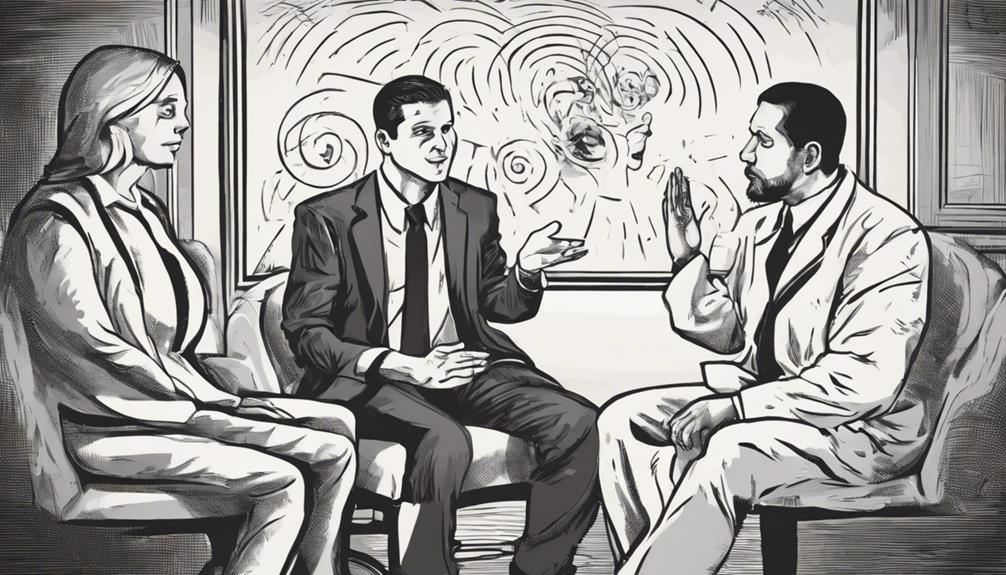Social-cognitive theories in hypnosis emphasize how social influences and cognitive processes shape hypnotic experiences. Expectancy, social dynamics, and self-efficacy impact receptiveness and responsiveness to hypnotic suggestions. Observational learning and cognitive restructuring techniques play significant roles in hypnotherapy interventions. These theories empower clients, fostering lasting change and overall well-being. Understanding these theories is pivotal in maximizing therapeutic benefits and modifying behavior patterns during hypnosis. The intricate interplay of social influences and cognitive processes offers valuable insights into the transformative power of hypnotherapy.
Social-Cognitive Theories Overview

Social-Cognitive theories in hypnosis provide a framework that emphasizes the role of social influences and cognitive processes in understanding the phenomena of hypnosis.
Social learning theory posits that individuals learn behaviors and attitudes through observation, imitation, and social reinforcement. In the context of hypnosis, social learning suggests that individuals may exhibit hypnotic responses based on their observations of others or the social context in which hypnosis occurs.
Cognitive processes, on the other hand, play a crucial role in shaping an individual's perception, interpretation, and response to hypnotic suggestions. These processes involve mental activities such as attention, memory, and problem-solving, which influence how an individual processes and responds to hypnotic suggestions.
For example, individuals with a high level of cognitive control may be more adept at engaging in hypnotic experiences due to their ability to focus attention and regulate cognitive processes effectively.
Role of Expectancy in Hypnosis
An integral aspect of understanding hypnosis lies in exploring the pivotal role of expectancy, which significantly influences an individual's receptiveness and responsiveness to hypnotic suggestions.
Expectancy effects in hypnosis refer to the impact of an individual's beliefs and expectations about hypnosis on their hypnotic experience. These effects are intertwined with the placebo response, where the individual's anticipation of change or improvement can lead to actual psychological or physiological changes.
Research indicates that individuals with higher expectations of the benefits of hypnosis are more likely to experience positive outcomes. The power of expectancy can shape the individual's mindset, affecting the depth of trance they enter and their susceptibility to suggestions.
Moreover, the expectancy effects play a crucial role in shaping the overall effectiveness of hypnosis interventions.
Understanding the role of expectancy in hypnosis highlights the importance of considering individual beliefs and expectations when utilizing hypnosis as a therapeutic tool. By harnessing expectancy effects and managing placebo responses, practitioners can optimize the outcomes of hypnotic interventions.
Influence of Social Factors

The impact of social factors on hypnotic responsiveness and outcomes is a key area of interest within hypnosis research. Social dynamics play a significant role in shaping an individual's susceptibility to hypnosis. The presence of an authority figure, such as a hypnotist, can influence a person's willingness to engage in hypnotic suggestions. This phenomenon is known as social compliance, where individuals may feel compelled to comply with the hypnotist's instructions due to the social context of the interaction.
Furthermore, behavioral influences within a social setting can also affect hypnotic experiences. Observing others responding positively to hypnosis can create a social norm that encourages similar behaviors in individuals. This concept aligns with Bandura's social learning theory, which suggests that individuals learn from observing others in social situations.
Self-Efficacy in Hypnotic Processes
Understanding the role of self-efficacy in hypnotic processes sheds light on how individuals perceive and engage with hypnotic suggestions. Self-efficacy, or one's belief in their ability to successfully execute behaviors to achieve desired outcomes, plays a crucial role in the effectiveness of hypnosis. Confidence building is a key component in enhancing suggestibility and responsiveness to hypnotic suggestions.
Individuals with higher levels of self-efficacy are more likely to be open to the hypnotic process and experience greater benefits such as performance enhancement and behavior modification. Suggestibility testing, often used in hypnosis, can be influenced by an individual's self-efficacy levels. Those with higher self-efficacy may exhibit greater responsiveness to suggestions, leading to more profound hypnotic experiences.
In the context of hypnosis for performance enhancement, individuals with enhanced self-efficacy are more likely to experience positive outcomes, such as improved athletic performance or public speaking skills. Similarly, behavior modification through hypnosis can be more effective when individuals have confidence in their ability to make desired changes. Overall, self-efficacy plays a significant role in shaping the outcomes of hypnotic processes.
Cognitive-Behavioral Elements

Exploring the interplay between cognitive and behavioral components provides valuable insights into the mechanisms underlying hypnotic processes. Cognitive processes play a crucial role in shaping individuals' responses to hypnotic suggestions. The way individuals interpret and process information during hypnosis can significantly influence their behavioral responses.
For instance, cognitive restructuring techniques used in hypnotherapy aim to modify maladaptive thought patterns, leading to more adaptive behaviors.
On the other hand, behavioral responses during hypnosis can impact cognitive processes. Through repeated exposure to hypnotic suggestions, learning mechanisms such as classical conditioning can shape individuals' responses over time. This conditioning process can enhance suggestibility and contribute to the effectiveness of hypnotic interventions.
Understanding the intricate relationship between cognitive processes, behavioral responses, learning mechanisms, and hypnotic effects is essential for maximizing the therapeutic benefits of hypnosis. By incorporating cognitive-behavioral elements into hypnotic interventions, clinicians can tailor approaches to individual needs, fostering positive outcomes in various clinical settings.
Impact of Observational Learning
Observational learning plays a significant role in shaping individuals' responses to hypnotic suggestions by influencing their perception of others' experiences and behaviors. Through observational learning, individuals can acquire new behaviors and attitudes by observing others, known as modeling effects.
In the context of hypnosis, individuals may observe someone successfully responding to hypnotic suggestions, which can increase their belief in the effectiveness of hypnosis and enhance their willingness to engage in the process themselves. This observational learning process can create a social influence that validates the hypnotic experience, making it more likely for individuals to respond positively to suggestions during hypnosis sessions.
Additionally, observing others experiencing positive outcomes from hypnotherapy can further reinforce the perceived benefits and efficacy of hypnosis, contributing to an individual's openness and receptiveness to the intervention. Overall, observational learning plays a crucial role in shaping individuals' perceptions and responses to hypnotic suggestions, highlighting the social-cognitive influences at play in hypnosis.
Implications for Hypnotherapy

The application of social-cognitive theories in hypnotherapy offers valuable insights into the ways individuals' perceptions and responses can be influenced during the therapeutic process. By utilizing these theories, hypnotherapists can tailor interventions to enhance therapeutic outcomes for clients. Social-cognitive theories provide a framework for understanding how beliefs, attitudes, and expectations can shape behavior, making them particularly relevant in hypnotherapy where altering perceptions and fostering positive change are central goals.
Therapeutic applications of social-cognitive theories in hypnotherapy include utilizing techniques such as modeling, guided mastery, and cognitive restructuring to help clients overcome challenges, manage symptoms, and improve overall well-being. These interventions are designed to empower clients, enhance self-efficacy, and promote lasting change.
Ethical considerations and practitioner responsibilities are crucial when applying social-cognitive theories in hypnotherapy. Practitioners must ensure that interventions are evidence-based, tailored to the individual needs of clients, and implemented in a safe and ethical manner. Respecting client autonomy, informed consent, and confidentiality are paramount in maintaining ethical standards in hypnotherapy practice. By upholding these ethical principles, practitioners can foster a therapeutic environment conducive to positive client outcomes.
Frequently Asked Questions
How Do Social-Cognitive Theories Explain Resistance to Hypnosis?
When considering hypnotic resistance, social factors have a significant impact. Self-efficacy, influenced by beliefs and experiences, affects hypnotic depth. Understanding how these cognitive processes interact sheds light on why individuals may resist or respond differently to hypnosis.
Can Social Factors Influence the Effectiveness of Post-Hypnotic Suggestions?
Social influences can significantly impact the effectiveness of post-hypnotic suggestions. Group dynamics, such as peer pressure or social expectations, can play a role in enhancing or diminishing the success of hypnotic interventions and suggestions.
Does Self-Efficacy Impact the Depth of Hypnotic Trance?
Self-efficacy, reflecting an individual's self-esteem and confidence in their abilities, can influence suggestibility and compliance during hypnosis, potentially impacting the depth of trance. Understanding these social-cognitive factors is crucial in optimizing hypnotic outcomes.
What Cognitive-Behavioral Techniques Are Commonly Used in Hypnosis?
Cognitive restructuring involves modifying thought patterns to achieve desired behavioral changes, often used in hypnosis for addressing negative beliefs. Behavioral rehearsal helps clients practice new behaviors. Self-regulation techniques enhance control, while relaxation techniques aid in achieving a hypnotic state.
How Does Observational Learning Affect Hypnotic Responsiveness in Individuals?
Observational learning plays a crucial role in shaping individual suggestibility levels and hypnotic susceptibility. Modeling effects through observing others undergoing hypnosis can influence an individual's responsiveness to suggestions, highlighting the impact of social-cognitive theories in hypnosis.
Conclusion
In conclusion, social-cognitive theories play a significant role in understanding the mechanisms of hypnosis. Expectancy, social factors, self-efficacy, cognitive-behavioral elements, and observational learning all contribute to the hypnotic process. These theories offer valuable insights into how individuals perceive and respond to hypnosis, which has implications for the practice of hypnotherapy.
By examining the interplay of cognitive processes and social influences, researchers and practitioners can enhance their understanding and application of hypnosis in therapeutic settings.


